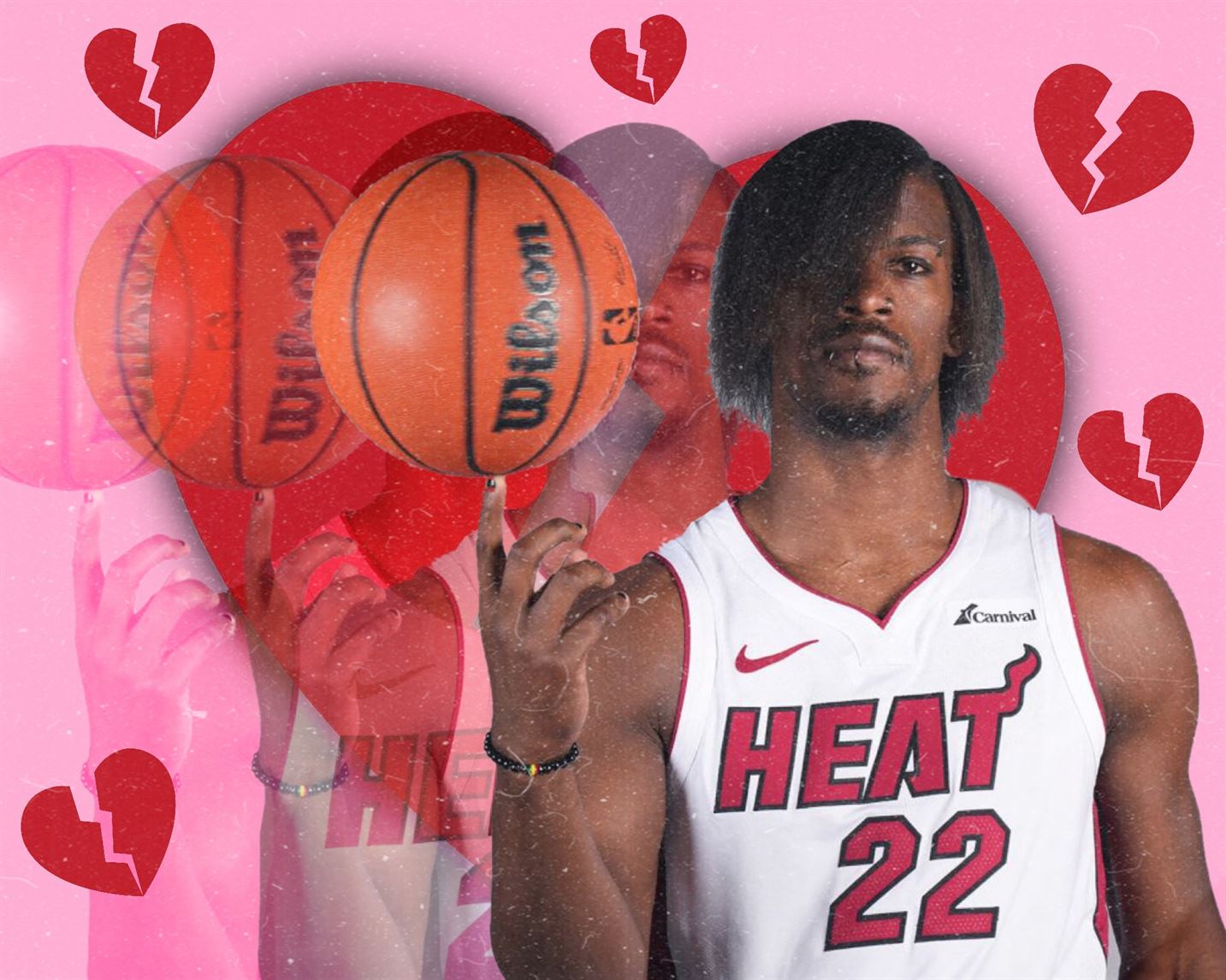The opinion pieces expressed in this publication, The Montclarion, are those of the author(s). They do not claim to reflect the opinions or views of the The Montclarion, other than Editorials written by The Montclarion Editorial Board staff.
Miami Heat’s star power forward Jimmy Butler showed out with a new spooky look on the National Basketball Association’s (NBA) Media Day, and the internet exploded. Well, not really but it certainly jumped.
Standing between his teammates Bam Adebayo and Tyler Herro during their photoshoot, he adorned their white uniform and straightened hair with an exaggerated side part as well as black eyeliner, a spiked piercing on his eyebrow, three labret hoops on his lip and finally a nose hoop.
I guess you could say he looked like someone who would enjoy a rave or two.
The thirty-four-year-old is already known for debuting timeless looks on media day as last year he was “Dread Head Jimbo.” His teammate, Herro said “He told me this was his Halloween today.” Adebayo was nothing but laughs, overall no one familiar with the league was really surprised. So why did this look intrigue more than just basketball fans?
Representation across all communities in every picture is the biggest step the oppressed can stand on to feel seen. A number of people, probably thousands felt seen by the antics of Jimmy Butler.
Though it might have been Halloween for him, for many being the ‘outcast’ is a day-to-day life.
Black, brown, indigenous and other people of color of any gender who adorn black eyeshadow and facial piercings on a regular basis rarely see themselves in any media let alone sports. Any step big or small is important.
Though the beginnings of the emo or alternative history begin with black icons who created rock and roll such as Chuck Berry and Rosetta Tharpe and the creator of and indubitably named Queen of Grunge, Tina Bell, the characterization of such does not reflect BIPOC as much as it should.
For BIPOC to present as against the grain of their given community in whatever way offered no warmth and not even acceptance from those within the outcast community. They were either not accepted at all or accepted in the outcast group.
Representation has come far and few in between with a great rise in the twenty twenties thanks to social media’s allowance for wide-scale sharing.
Before the days of social media and before Jimmy Butler, before you could be unapologetically yourself, icons and risk-takers were genuine rarities and pushed to the side a little. In the nineties, Chicago Bulls legend Dennis Rodman is the primary modern and best outcast not just as an athlete but as an icon in general. Not just for media day, Rodman regularly wore piercings as well as painted nails, regularly dyed his hair different colors and designs, wore crop tops, baggy jeans and even once a wedding dress as a black man. To those paying attention, Rodman was saying be yourself and love the self that you are, he was saying do not be afraid.
Melanie Martinez who came on the scene in the twenty-tens always portrayed an un-classical style true to herself involving half-black and half-colored hair and coquette clothes. As a woman of Dominican and Puerto Rican descent, Martinez put out alternative electropop childhood and doll-themed music and was met with success. Martinez was saying you do not have to fit in a box.
Ten pages could be written about the impact of Frank Ocean alone.
Why does it matter that just one person or two or four put this attitude out there?
As stated before, it allows everyday people who are not pictured every day to go out in their hometowns wearing what they want, listening to who they want and being accepted within their community. It tells the community that outcasts are everywhere, and to accept it and move on. Rodman was not the first to do this, Butler will not be the last.
Now in the 21st century, there are hundreds of alternative and emo artists and style icons from all communities, from Mitski to Pinkpantheress, to Aliyah’s Interlude and many more with hopefully more to come, raised by those who pushed open the doors for them and proudly themselves.



